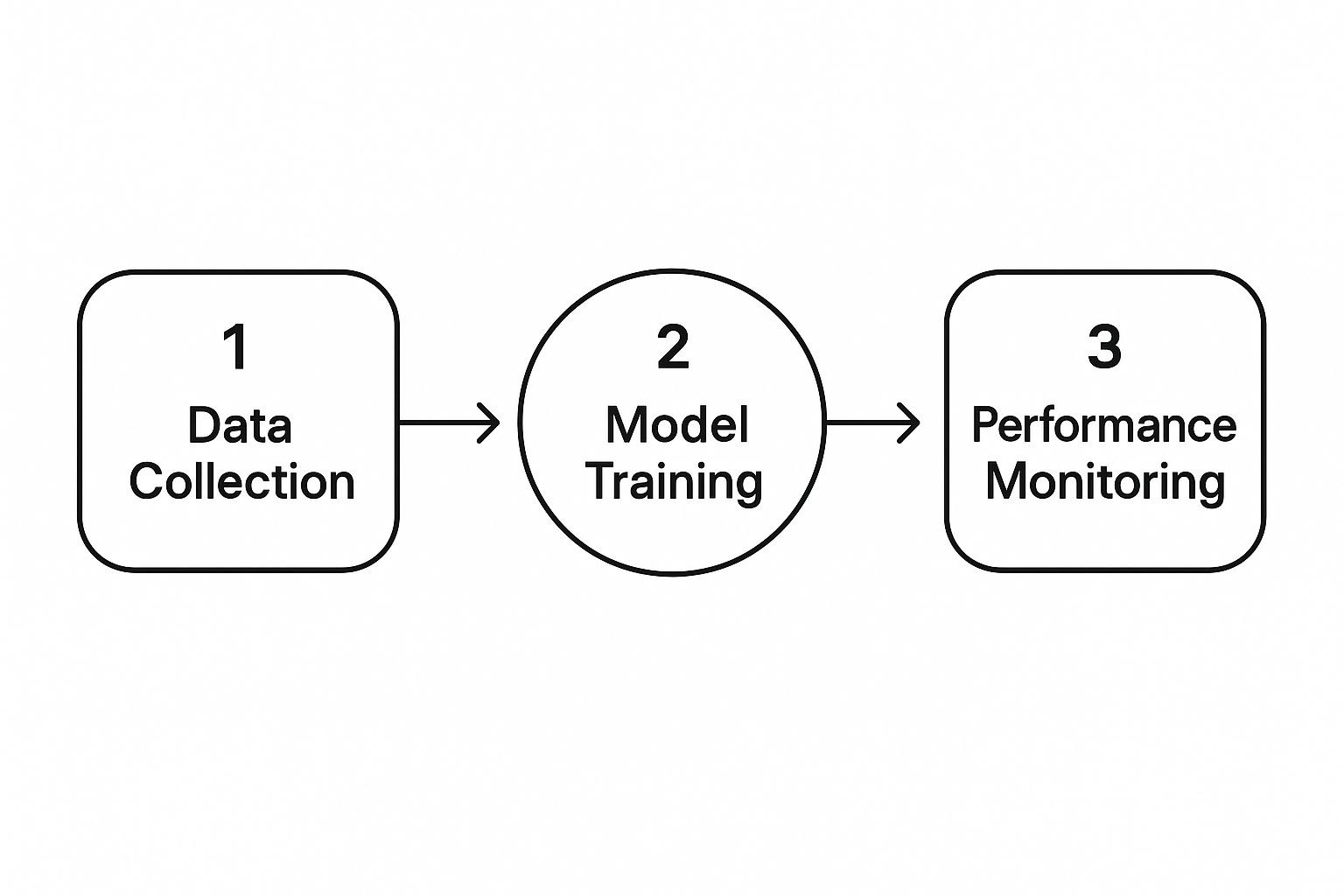Master AI Overviews Optimization for Better Search Visibility
AI Overviews Optimization isn't just a new buzzword; it's a fundamental shift in how we approach SEO. It's the art and science of getting your content cited as a primary source inside Google's AI-generated answers.
Your goal is no longer just to be another blue link on the results page. It's to become the trusted reference the AI uses to craft its response.
Why AI Overviews Optimization Matters Now

Google's rollout of AI Overviews is changing how people get information online. The game of clawing your way to the #1 spot is evolving fast. Now, the most valuable real estate is inside that AI-generated answer box at the very top of the page.
Think of traditional SEO as meticulously organizing a library's card catalog-it's crucial for helping people find the right book. But AI Overviews Optimization is like becoming the expert librarian who's already read all the important books and can give a direct, synthesized answer on the spot. Your job is to become the go-to source this "librarian" trusts and quotes.
Beyond Keywords to Citable Expertise
This new reality requires us to move beyond simply targeting keywords. While they still have a place, the real focus is now on proving your content's Expertise, Authoritativeness, and Trustworthiness (E-E-A-T). Google's AI is built to find and feature content that doesn't just mention a term, but explains it with unmistakable clarity and credibility.
This means your content strategy has to change for good. To win, you need to:
- Answer questions directly and concisely.
- Structure content logically so an AI can easily parse it.
- Build and showcase your authority on the topic.
Becoming a citable source isn't just about rankings anymore; it's about becoming a definitive voice in your field. For a deeper look at the tactics involved, you can explore our full guide on AI Overview optimization strategies.
The core change is this: Instead of users clicking a link to find an answer, Google's AI creates an answer for them, citing its sources. Your job is to be the best possible source.
The urgency here can't be overstated, especially when you look at the numbers. The global AI market was valued at USD 638.23 billion in 2024 and is projected to explode to over USD 3.68 trillion by 2034. This isn't a passing fad; AI-driven features like Overviews are the future of how people will discover information. If you don't adapt, you risk becoming invisible.
How to Create AI-Ready Content

Alright, let's move from theory to action. Creating AI-ready content really just boils down to making your information as clear, trustworthy, and digestible as humanly possible.
Think of Google's AI as your smartest but most impatient reader. It needs to grasp your main points in seconds, trust your facts, and feel confident quoting you.
This whole process stands on three pillars: conversational clarity, contextual depth, and structured answers. Getting these right is the core of any solid AI overviews optimization strategy.
Write with Conversational Clarity
First things first: write like a human, for other humans. AI models are trained on natural language, so getting bogged down in complex jargon or dense academic writing is a surefire way to be ignored. You have to be direct.
Imagine you're explaining a complex idea to a coworker over coffee. You'd be clear, straightforward, and you'd skip the fluff. That's the exact tone you're aiming for.
An AI Overview is a synthesis of information. The easier you make it for the AI to deconstruct and understand your content, the more likely your key points will be included in its final summary.
This means you need to put the answer to the user's primary question right up front. Don't bury the lede. State your main point in the first couple of paragraphs so the AI can immediately see what your article is about and pull the most vital information.
Build Contextual Depth and Structure
Clarity is just the start. Your content also needs to be deep and comprehensive. An AI model is always on the hunt for the most complete answer, which means you need to approach your topic from multiple angles. It's less like writing a short blog post and more like creating a definitive encyclopedia entry.
To do this, you need to build a rich, interconnected web of information around your topic. Here's how you can create that contextual richness:
- Answer Related Questions: Use H3 or H4 subheadings to directly address the follow-up questions a user would naturally have.
- Strategic Internal Linking: Build topic clusters by linking to other relevant posts on your site.
- Use Data and Evidence: Back up claims with recent statistics and expert quotes.
This approach turns a simple article into a truly well-rounded resource. For a more detailed strategy, see our guide on AI search optimization.
Building Expertise and Authority for AI

While structured content and clear language are vital, they won't get you very far on their own. The single most important factor in AI overview optimization is proving you are a legitimate, trustworthy source via E-E-A-T: Experience, Expertise, Authoritativeness, and Trustworthiness.
Proving Your Expertise to AI Models
Demonstrating E-E-A-T isn't a one-off task; it's a consistent strategy baked into your entire digital presence.
- Develop Robust Author Bios: Showcase credentials and experience.
- Showcase Credentials and Awards: Display certifications and recognition prominently.
- Earn Mentions from Respected Sites: Secure high-quality backlinks and expert quotes.
The AI doesn't just read what's on your page; it assesses your reputation across the entire web.
The AI market is projected to grow at a CAGR of 28.46% between 2024 and 2030, contributing up to $15.7 trillion to the global economy. Explore the stats for more context.
Using Structured Data to Speak AI's Language
If creating clear, authoritative content is how you show your expertise, then structured data is how you translate it into a language AI models can instantly understand. It's the difference between an AI guessing what your content is about and you explicitly telling it.
Making Your Content Machine-Readable
Without structured data, an AI can easily get confused. Schema markup removes that guesswork.
Structured data acts as the ultimate signposting for your content. It turns a wall of text into a neatly organized set of facts.
Key Schema Types for AI Overviews
| Schema Type | Primary Use Case | Benefit for AI Overviews |
|---|---|---|
| FAQPage | Marking up Q&A pairs | Signals clear answers to queries |
| HowTo | Step-by-step processes | Makes instructions easy to extract |
| Article | Blog posts, news, features | Reinforces freshness & author info |
| Product | Product details & reviews | Clarifies commercial data |
| LocalBusiness | Business NAP info | Ensures accuracy for geo queries |
Your Workflow for AI Overviews Optimization
Putting these principles into practice requires a structured, repeatable process. Think of it as a pre-flight check before hitting publish.
The Four Stages of AI-Ready Content Production
- Conversational Keyword Research – Discover full questions and long-tail queries.
- AI-Focused Content Outlining – Use logical heading hierarchy tackling each sub-topic.
- E-E-A-T-Driven Writing and Editing – Draft with clarity, evidence, and credibility.
- Pre-Publication Technical Audit – Validate schema, internal links, and readability.

By aligning your workflow with these principles, you reverse-engineer how AI finds and synthesizes information.
AI agents are poised to explode from USD 5.43 billion in 2024 to USD 236.03 billion by 2034. Read the market report for full context.
Got Questions About AI Overviews? We've Got Answers
Will AI Overviews Replace Traditional Results?
Highly unlikely. AI Overviews serve users who want quick synthesized answers, while traditional results remain vital for navigational and transactional searches.
How Can I Track My Performance in AI Overviews?
Until Google Search Console offers dedicated reporting, combine third-party tools, CTR monitoring, and traffic analysis to gauge visibility.
Is This Only for Big Websites?
No. Expertise is the great equalizer. Niche sites with deep authority can absolutely win AI citations.
Ready to master your visibility in this new AI-driven search world? Sellm specializes in GEO and brand monitoring within AI environments like ChatGPT and Google Overviews. Our platform gives you the insights needed to ensure your brand is seen and cited. Learn how Sellm can optimize your AI visibility today.